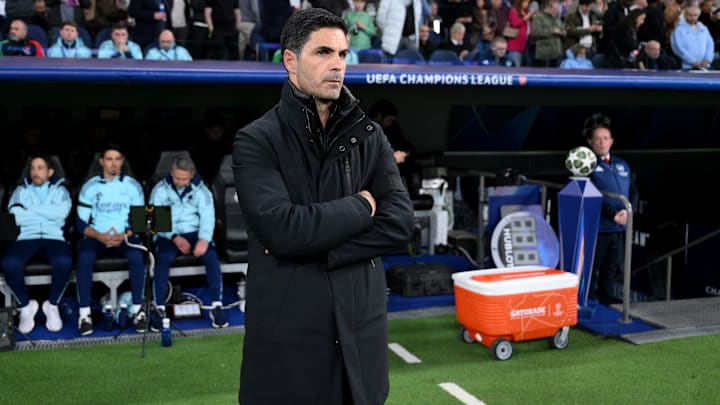Success in Europe is changing the narrative about Mikel Arteta's "process" at Arsenal in a very subtle way.
There's something deeply ironic about Arsenal returning to the last four of the UEFA Champions League for the first time since 2009. Something about what that progress says about Mikel Arteta's much revered "project."
He has Arsenal in the box seat to lift Europe's most prestigious trophy for the first time in club history becaue of an unusual reason. Because everything Arteta's done wrong in the Premier League has been the right thing for surviving on the continent.
In other words, all of the transfer and tactical decsions Artetra has made that hold his team back from domestic success, actually make the Gunners well-equipped to win the Champions League. This contrast was summed up perfectly during the 5-1 aggregate thumping of holders Real Madrid.
Put simply, Arsenal were stronger and quicker than the 15-time winners. Stronger and quicker because the Gunners have been built that way.
They've been built to out-physical the opposition. Built on height and muscle first, technical ingenuity second.
Arteta's dour vision perfect for Europe

He emerged from Barcelon'a famed La Masia academy as a creative playmaker, then spent the final years of his playing career crafting pretty patterns for football purist and Arsenal legend Arsene Wenger. Arteta followed this education in the finer points of the beautiful game with a dream coaching internship under Pep Guardiola, another purveyor of a pass first ask questions later brand of football.
It's the CV of an attack-minded practioner married to an enterprising way to play the game. What's surprising is Arteta's default setting as a manager is anything but expansive.
He's always been more George Graham than Wenger. Think back to the triumphant FA Cup campaign in 2020, when Arteta the interim helped Arsenal claim the trophy for a record 14th time with a back five rearguard action Graham would have been proud to call his own.
The stubborn and densely populated defensive structures were augmented by the sudden-strike capability of contract-hunting prolific striker Pierre-Emerick Aubameyang. That same formula is alive with this season's Arsenal side. Just replace David Luiz with William Saliba and Aubameyang with Bukayo Saka.
Having the increasingly resilient Saka as the leading light makes the current Arsenal team something closer to the first iteration of Chelsea under Jose Mourinho. A rock-solid defensive unit enlivened by magic from wing wizard Arjen Robben, the player Saka most often emulates.
That Chelsea side couldn't get beyond the semi-final stage thanks to Rafa Benitez and pesky Liverpool. These Gunners will hopefully go one or two better, but they'll do it following the same formula.
An unyielding defence covered by an energetic, workmanlike midfield, set-piece prowess and pace up top. It's an age-old blueprint perfect for cup football, and the Champions League is still a cup tournament, albeit one with more than its share of window dressing.
Arsenal can frustrate, bus park, set piece and counter past a free-flowing Paris Saint-Germain in the next round, but those same things have left the Gunners short on more familiar shores.
Arsenal's "project" missing inspiration in the Premier League

Arteta has, inadvertently or otherwise, adapted to the more pragmatic demands of European football in a way Wenger rarely ever did. Flip things around the other way, and Wenger knew the value of skill and something special for helping win the domestic game's biggest prize.
Flair often came before function in Wenger's day, but the imbalance works in reverse with Arteta. There's still no gifted striker to lead the line, despite a few attempts and several windows to get it right.
Martin Odegaard is still the lone string-puller in the final third. He'd have had too much company in Wenger's day, but Odegaard has been made a rare species on Arteta's watch thanks to the decisions to offload Emile Smith Rowe and Fabio Vieira.
The transfer policy under Arteta shows why his team has consistently trailed front-loaded Manchester City and Liverpool squads in recent years. While those clubs have maintained and even added to their attacking riches, Arteta has used his windows to stock up on inverted full-backs and rugged or defence-first midfielders.
This has constructed a team hard to beat, but one not always equipped to turn on the style and win close games. Too many points have been squandered thanks to a lack of firepower and the absence of difference-makers in clutch moments.
Those failings compound over a longer period of time, like a 38-game league campaign. Even that Chelsea team supplemented Robben with Didier Drogba, Eidur Gudjohnsen, Joe Cole, Damien Duff and 20-plus goals from midfield by Frank Lampard.
The Gunners need more in attacking areas if they're going to reign supreme again in England, but Arteta's more conservative efficiency could be perfect for that elusive Champions League goal.
